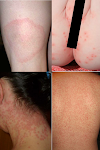Sunscreen offers useful safety, but some formulations can cause difficulties if your son or daughter has sensitive skin and pores. Try looking for sunscreens without para-aminobenzoic acid (PABA), a component that could be bothersome. For children older than six months past, apply broad spectrum sunscreen, blocking UVA and UVB rays of SPF 30 or higher. For babies younger than six months, ask your healthcare provider for guidance.
Antibacterial cleaning soap Safety:
Excellent in idea, antibacterial liquid soaps can present some difficulties. The common ingredient triclosan can be irritating to young people with delicate skin. The FDA is also under criticism of the chemical due to reports that clearly show that it can influence progress and improvement. To kill germs, frequent soap and drinking water will work just as effectively.
Difficulties of eczema with lotion:
It's tempting to keep your child's pores and skin soft with lotion, but moisturizers can have fragrances that irritate sensitive pores and skin, especially in young people who already have eczema. And there are actually questions about whether some elements, like parabens and phthalates, can trigger hormonal challenges. For dry pores and skin, use mild soap, pat (do not rub) pores and dry skin right after bathing, and consult your pediatrician for lotion recommendations.
Wipes or wipes for newborns?
Disposable toddler wipes certainly have a task to try and do, but they can contain alcohol and any variety of fragrances that cause pores and skin discomfort. Some wipes even have preservatives that can trigger allergies. Contact dermatitis, a rash, or hives due to an allergy resulting in a compound. Instead, use damp cloths. When traveling, hold the wet wipes in a zip-lock sandwich bag.
Laundry detergent and rashes:
The substances in some laundry detergents can trigger irritants. Make contact with dermatitis, a rash from touching something that irritates the pores and skin. It is much more frequent in young people who have eczema. To help stop it, use a mild detergent without additional perfumes or dyes. Also, be sure to rinse all of your son or daughter's clothes, bedding, and towels no less than 2 times so you can remove detergent residue.
Shampoo and conditioner sensitivity:
Look at the component label before lathering your child's hair. Some fragrances and chemicals in shampoos and conditioners can bother delicate scalps. Research has also identified some ingredients such as phthalates, formaldehyde, and one, four dioxane as possible health and fitness fears. To be generally harmless, try searching for purely natural products and solutions while using the fewest fragrances, substances and general substances included.
Material softener Alternative options:
If your son or daughter has sensitive skin, you may want to avoid liquid fabric softeners and dryer sheets. These products may include substances and fragrances, such as limonene and benzyl acetate, which will irritate the pores and skin, eyes, nose and throat. Alternately, try including 1/2 cup of baking soda or one / two cup of vinegar in the washer rinse cycle to help keep clothes soft.
Household cleaners and health:
The "non-toxic" time period will not be controlled, so check the ingredient label on household cleaners. For example, alkylphenol ethoxylates (APEs), which are found in some detergents and disinfectants, can cause hormonal difficulties. Ammonia can irritate the lungs, burn pores and skin, which is toxic if ingested. Try to find products with much less chemicals included or clean them with water and baking soda or vinegar.
Preservatives in cleaning soap:
Some cleaning soaps, even labeled baby products, may contain formaldehyde, a preservative that can cause irritation to the skin, eyes, and lungs. Cleaning soap can also cause eczema: inflamed and irritated skin. Eczema is most often found in young children and younger children, especially when they already have allergic reactions or asthma. Look for products without fragrances or chemicals.
Bug Spray and sunscreen:
Keep away from the combination of DEET insect repellent and sunscreen. Research shows that the chemical can be absorbed more frequently in pores and skin when combined with sunscreen, and DEET can also make sunscreen considerably less successful. The American Academy of Pediatrics recommends working with repellents with no more than thirty% DEET in young children. Insect repellents are not recommended for babies younger than two months.
Tracked pesticides indoors:
Due to the fact that infants and toddlers spend a lot of time on the floor, contaminants have accumulated on the floor and rugs can get into your son or daughter's mouth. Pesticides along with other toxins are tracked with dust from the home. The little ones touch it and swallow it if they put their arms inside their mouths. Be sure to clean all surfaces in the home, especially floors, with safe cleaning products.







1 Comments
Quality information
ReplyDeleteHow to use dragon fruit peel? Click the link below to know
https://www.ooltahchasma.xyz/2020/06/How-use-Dragonfruit-peel.html